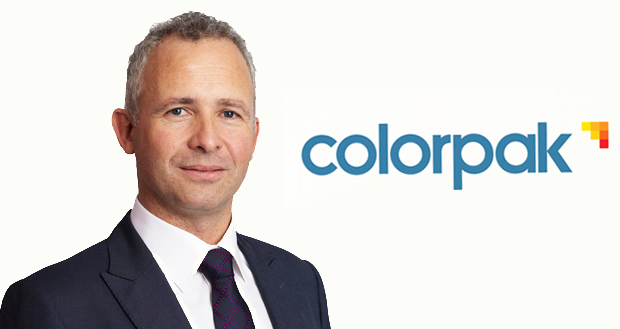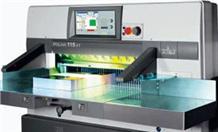It is a rare early morning that Guy Marco is not assiduously going through his mandatory laps at Sydney’s suburban Hurstville Indoor Pool. His keep-fit philosophy applies equally to the Impress Printers, the business that he and his co-director, Jeff Williams, have steadily built up over the past decade.
After 40-odd years in print, both bring an inherent passion for the industry. The company has built an impressive customer base, an impeccable reputation for insisting on top-level service and quality output and no fewer than 23 National Print Awards in its 11-year history.
Impress offers a lot to be impressed with, and Marco expects a strong future for his mid-size operation. His confidence is catching, laced with a likeable amalgam of European passion (young Guido arrived in Queensland from his native Italy some 50 years ago) and Australian bonhomie. One comes away with the feeling that here is a man whose entrepreneurial ethos is tempered by a management style learned in the school of hard knocks.
Marco is a refreshingly no-nonsense boy from the bush. He grew up in North Queensland where his Italian migrant father’s cane-cutting career made it possible five years later for his wife and young son to follow him to Australia.
Marco reminisces on his early years, when he rebelliously rejected his father’s career suggestion to become a panelbeater. Instead, he chose to become a compositor. This, however, was not without it’s setbacks – it was put on hold when a union official noted that the word ‘compositor’ had been misspelled on the application form!
He did his apprenticeship at venerable printing house Sydney Allen, one of the first steps in a 43-year graphic arts career. Having attained senior management ranks at Allens, the urge to entrepreneurship took him to Alpha Imaging’s Jeff Williams. The two of them jointly pursued their business ambitions to provide a top-quality product backed by top-notch service. They’ve been providing it ever since. The early days were anything but easy, Marco recalls. It needed all hands to the wheel with son, Matthew and then newlywed wife Leonie helping to ensure customers’ orders were dispatched on time.
From the very beginning, the Impress operation has been based on one of Guy Marco’s long-held beliefs in the efficiencies of direct-to-plate. A film-free environment from day one, the shop operated in its earlier days without the need for CTP equipment. But increasing volumes in recent years and a second five-colour Heidelberg reversed that decision.
Marco insists on stringent environmental disciplines with an emphasis on recycling. He recently became one of the first Australian users of Kodak’s new Trillian plate, which the vendor says is an ideal compromise between environmental credentials
and performance.
Another bugbear for Marco is the issue of the current skills decline. He comments somewhat scathingly on the falling-off in the skills among print buyers. “The young people coming through are a real concern in this regard.”
With Williams steering the marketing function, Marco oversees every detail of production and warehousing and fulfilment. He is a firm believer in employing only fully trained staff – with a workforce of 15-20 and high volumes rolling off the presses every day, there is simply no time for staff training.
Discussing other current trends in the industry, the question of selling on price inevitably rears its head. It is a mark of the man that he expresses an independence of thought on the topic. His take on price competition is a down-to-earth observation that “the market has sorted that out”.
Price cutting
Marco’s philosophy is that if you start cutting prices, you’re soon out of business. The most logical way to attack the problem, he believes is that “you needs to structure your company around this new way of approaching the question of price – do you compromise on service or quality? Absolutely not. It costs as much to do a bad job as it does to do a good job.”
In terms of the impact of digital print, Marco can see the writing on the wall as clearly as everyone else. But he has definitive reservations about some claims, and says that digital still has some way to go to match offset.
In terms of the threat from electronic media, he accepts that certain components of the industry will suffer in the next five years, notably the book printing segment.
“There will be losses to electronic books and at the lower end. Business stationery volumes are rapidly declining and we are starting to see that lower end of the industry beginning to disappear. Neither segment impact on us,” he says and adds that Impress Printers’ future direction will be “more of the same” and that “the next half decade will confirm the scenario of the super shops, the Geons and the Blue Stars and medium-sized houses like ours”.
The company has consistent two-shift output on his two five-colour Heidelberg presses. Not that he sees the Impress future totally tied to the offset world. Between 15-20% of the company’s colour production is now accounted for by the firm’s Fuji Xerox Docucolor 8000AP. The volume of short-run digital output has justified the original conviction that full service means just that – full service.
Marco says there is more trouble to come over the next five years due to the industry’s skill base. He is highly critical of the investment in training – or the lack of it. He laments the fact that TAFE is not the force it used to be, with commercial constraints meaning more and more training must be done on the premises, with all the distractions this implies.
On the positive side of the ledger, Marco sees opportunities continuing to allow new technology to enable print shops such as his to improve their level of service.
“Graphic arts is an industry with longevity. As a supposed traditional print shop, you will be supplying many services other than traditional print,” he says.It is obvious that Impress Printers, under the effective direction of Marco and Williams, is constantly on the lookout to broaden its range of services.
“If we are to hold our head above water, we will have to go on doing so,” he adds. And Marco, the energetic swimming enthusiast, knows a lot about that.
Guy Marco on…
… management style
Will I compromise on service or quality? Absolutely not. It costs as much to do a bad job as it does to do a good job
… the future of the mid-size printer
Where does the mid-size printer go to get quality service, let alone quality work? That’s where companies our size come in, on the strict proviso that you can match [the big conglomerates] with up-to-date technology. Their customers often have to go through too many channels. From that point of view, I think we’re in a very good position.
… the one thing he would change about the printing industry
It would be the environmental garbage that’s been published about our industry. We have allowed people to come in an portray us as the bad environmentalists – we’re the people who chop down trees – when in fact we’re one of the cleanest industries around these days. What makes it sad is that the graphic arts industry is the communications industry and we have not sold our story.
Comment below to have your say on this story.
If you have a news story or tip-off, get in touch at editorial@sprinter.com.au.
Sign up to the Sprinter newsletter


